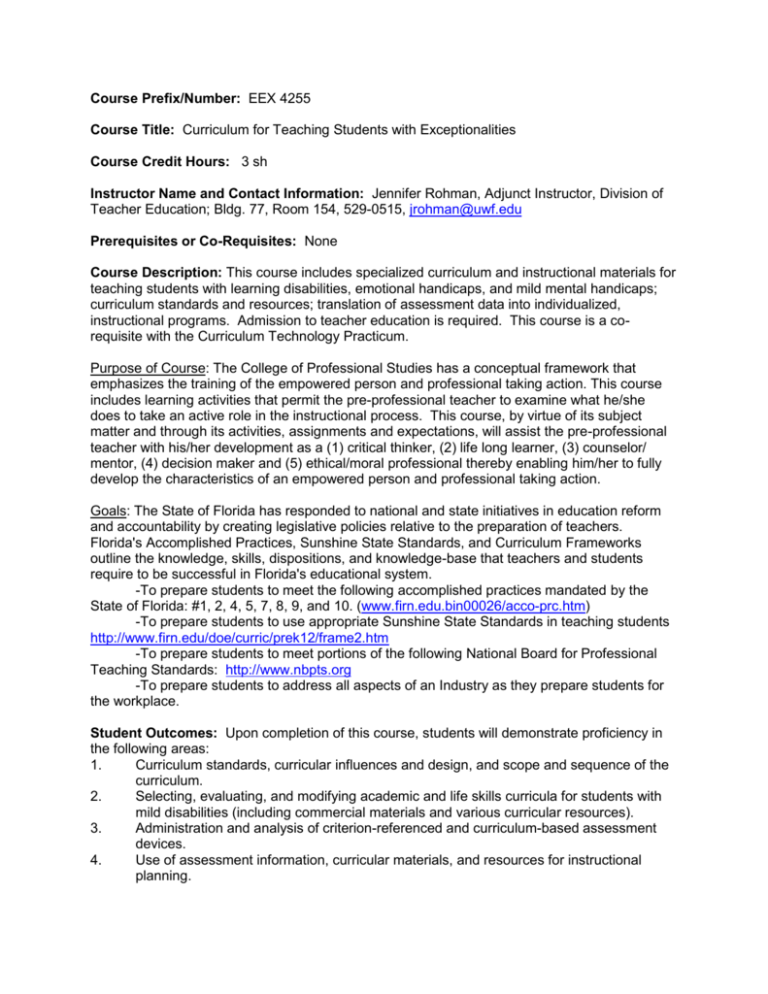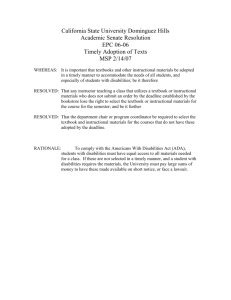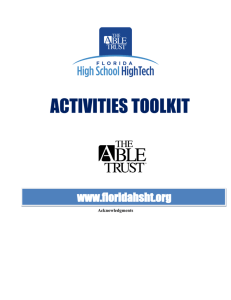
Course Prefix/Number: EEX 4255
Course Title: Curriculum for Teaching Students with Exceptionalities
Course Credit Hours: 3 sh
Instructor Name and Contact Information: Jennifer Rohman, Adjunct Instructor, Division of
Teacher Education; Bldg. 77, Room 154, 529-0515, jrohman@uwf.edu
Prerequisites or Co-Requisites: None
Course Description: This course includes specialized curriculum and instructional materials for
teaching students with learning disabilities, emotional handicaps, and mild mental handicaps;
curriculum standards and resources; translation of assessment data into individualized,
instructional programs. Admission to teacher education is required. This course is a corequisite with the Curriculum Technology Practicum.
Purpose of Course: The College of Professional Studies has a conceptual framework that
emphasizes the training of the empowered person and professional taking action. This course
includes learning activities that permit the pre-professional teacher to examine what he/she
does to take an active role in the instructional process. This course, by virtue of its subject
matter and through its activities, assignments and expectations, will assist the pre-professional
teacher with his/her development as a (1) critical thinker, (2) life long learner, (3) counselor/
mentor, (4) decision maker and (5) ethical/moral professional thereby enabling him/her to fully
develop the characteristics of an empowered person and professional taking action.
Goals: The State of Florida has responded to national and state initiatives in education reform
and accountability by creating legislative policies relative to the preparation of teachers.
Florida's Accomplished Practices, Sunshine State Standards, and Curriculum Frameworks
outline the knowledge, skills, dispositions, and knowledge-base that teachers and students
require to be successful in Florida's educational system.
-To prepare students to meet the following accomplished practices mandated by the
State of Florida: #1, 2, 4, 5, 7, 8, 9, and 10. (www.firn.edu.bin00026/acco-prc.htm)
-To prepare students to use appropriate Sunshine State Standards in teaching students
http://www.firn.edu/doe/curric/prek12/frame2.htm
-To prepare students to meet portions of the following National Board for Professional
Teaching Standards: http://www.nbpts.org
-To prepare students to address all aspects of an Industry as they prepare students for
the workplace.
Student Outcomes: Upon completion of this course, students will demonstrate proficiency in
the following areas:
1.
Curriculum standards, curricular influences and design, and scope and sequence of the
curriculum.
2.
Selecting, evaluating, and modifying academic and life skills curricula for students with
mild disabilities (including commercial materials and various curricular resources).
3.
Administration and analysis of criterion-referenced and curriculum-based assessment
devices.
4.
Use of assessment information, curricular materials, and resources for instructional
planning.
5.
Planning an integrated unit based on the Sunshine State Standards, Goal 3 Standards,
and learning needs of a group of students with diverse needs.
RequiredTexts:
Polloway, E. A., Patton, J. R., & Serna, L. (2005). Strategies for teaching learners with special
needs (8th ed.). Upper Saddle River, NJ: Pearson Prentice Hall.
Mager, R. F. (1997). Preparing instructional objectives. Atlanta, GA: The Center for Effective
Performance, Inc.
Teaching Resources for Florida ESE Teachers: http://www.cpt.fsu.edu/ese/
Relevant Websites:
Teaching Resources for Florida Exceptional Student Education: http://cpt.fsu.edu/ese
Florida Department of Education: www.firn.edu/doe
Links to special education programs:
http://curry.edschool.virginia.edu/go/cise/ose/resources/legal.html
Council for Exceptional Children: www.cec.sped.org
Federal Resource Center for Special Education: http://www.dssc.org/frc
Resource Directory for Special Education: http://www.brusdso.odedodea.edu/special/home.html
IDEA: http://www.ideapractices.org
Internet Resources for Special Children (IRSC): http://www.irsc.org
Comprehensive List of Disability-Related Web Sites: http://www.icdi.wvu.edu/Others.htm
LD OnLine-interactive guide to learning disabilities: http://www.ldonline.org
National Center for Learning Disabilities, Inc.: http://www.ncld.org
Learning Disabilities Association of America: http://www.ldanall.org
Association for Retarded Citizens: http://www.thearc.org
American Association on Mental Retardation: http://www.aamr.org
Resources in emotional or behavioral disorders: http://www.gwu.edu/~ebdweb/index.html
Resources for VE teachers: Http://cpt.fsu.edu/TREE/VE/TOFC.html
Inclusive Education: http://www.uni.edu/coe/inclusion/cooperative.html
National Transition Alliance: http://www.dssc.org/nta/index.html
Instructional Technology Resource Center (ITRC): http://www.itrc.ucf.edu
National Center on Educational Outcomes (NCEO): http://www.coled.umn.edu/nceo
Special Educator’s Web Page (lesson plans, etc.): http://www.geocities.com/Athens/Styx/7315
Recommended Texts:
Brolin, D. E. (1993). Life centered career education. Reston, VA: The Council for Exceptional
Children.
Lloyd, R. J., & Brolin, D. E. (1997). Life centered career education: Modified curriculum for
individuals with moderate disabilities. Reston, VA: The Council for Exceptional Children.
Choate, J. S., Enright, B. E., Miller, L. J., Poteet, J. A., & Rakes, R. A. (1995). Curriculum-based
assessment and programming (3rd ed). Boston: Allyn and Bacon.
Cronin, M. E., & Patton, J. R. (1993). Life skills instruction for all students with special needs.
Austin, TX: ProEd. (To order Pro-Ed, 8700 Shoal Creek Blvd., Austin TX 78757; Phone:
512-451-3246.
Strunk, W., & White, E. B. (1979). The elements of style (3rd ed.). New York: Macmillan.
Course Requirements:
1.
2.
3.
4.
5.
6.
Attendance - Class sessions will consist of lecture, discussion, and activities designed to
enhance students’ understanding of course concepts. Therefore, students are required
to be on time, have regular attendance, and participate in class discussions and
activities. Two points will be subtracted from the final grade for each missed class (2
excused absences).
Participation - Please be on time, regular in attendance, and involved in class activities
and discussion. Participation, including periodic quizzes and group activities, will be
considered in assigning a final grade. All assignments are due at the assigned time.
Five (5) points will be deducted per day for late assignments.
Use of laptops during class are not permitted. Please have all documents printed
out before class.
Tests - Tests on the assigned readings and lectures will be administered. Make-up
exams are not permitted except with instructor approval in advance. If you are late or
absent for a test, you may take (with permission) an alternate test during final exam
week.
Curriculum-Based Assessment Kit - You will be required to develop a curriculum-based
assessment kit, administer the kit to a student with disabilities, and report the results.
Detailed information for the project will be provided on a separate handout. The CBA Kit
is due on the assigned due date (see schedule). Five (5) points will be deducted per day
for late assignments.
Incompletes (I) will not be given except under extreme circumstances. Please see
college catalog for rules about incompletes and course withdrawals.
Grade Determination:
2 Tests @ 50 points each
Curriculum Kit Project
4 Online Assignments @ 10 pts. each
Final Exam
(Integrated Unit Plan)
Total
Grading Scale
100-94% = A, 93-90%= A89-87% = B+, 86-84%= B, 83-80%=B79-77% = C+, 76-74%= C, 73-70%=C69-60% = D, below 60% = F
100 points
100 points
40 points
100 points
340 points
Expectations for Academic Conduct/Plagiarism Policy: As members of the University of
West Florida, we commit ourselves to honesty. As we strive for excellence in performance,
integrity—personal and institutional—is our most precious asset. Honesty in our academic work
is vital, and we will not knowingly act in ways that erode that integrity. Accordingly, we pledge
not to cheat, nor to tolerate cheating, nor to plagiarize the work of others. We pledge to share
community resources in ways that are responsible and that comply with established policies of
fairness. Cooperation and competition are means to high achievement and are encouraged.
Indeed, cooperation is expected unless our directive is to individual performance. We will
compete constructively and professionally for the purpose of stimulating high performance
standards. Finally, we accept adherence to this set of expectations for academic conduct as a
condition of membership in the UWF academic community.
The Student Code of Conduct sets forth the rules, regulations and expected behavior of
students enrolled at the University of West Florida. Violations of any rules, regulations, or
behavioral expectations may result in a charge of violating the Student Code of Conduct. It is
the student's responsibility to read the Student Code of Conduct and conduct themselves
accordingly. You may access the current Student Code of Conduct at
http://www.uwf.edu/judicialaffairs.
Assistance: Students with special needs who require specific examination-related or other
course-related accommodations should contact Barbara Fitzpatrick, Director of Disabled
Student Services (DSS), dss@uwf.edu, (850) 474-2387. DSS will provide the student with a
letter for the instructor that will specify any recommended accommodations.







